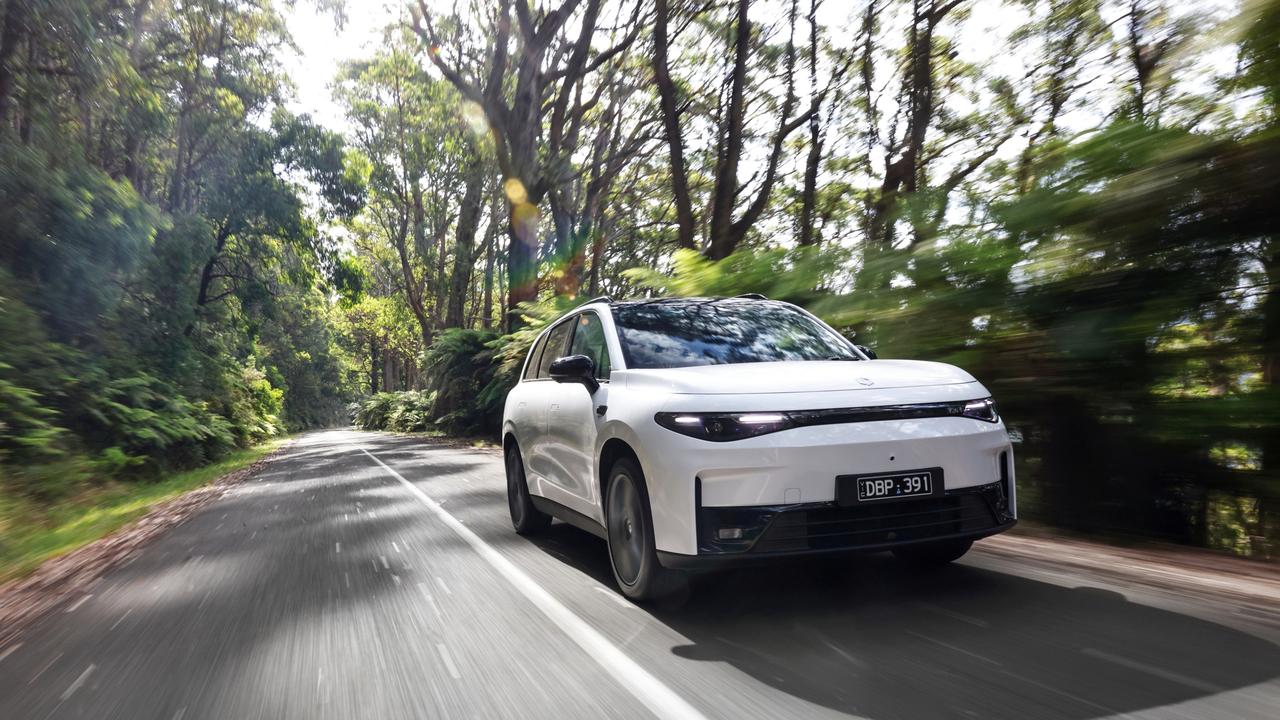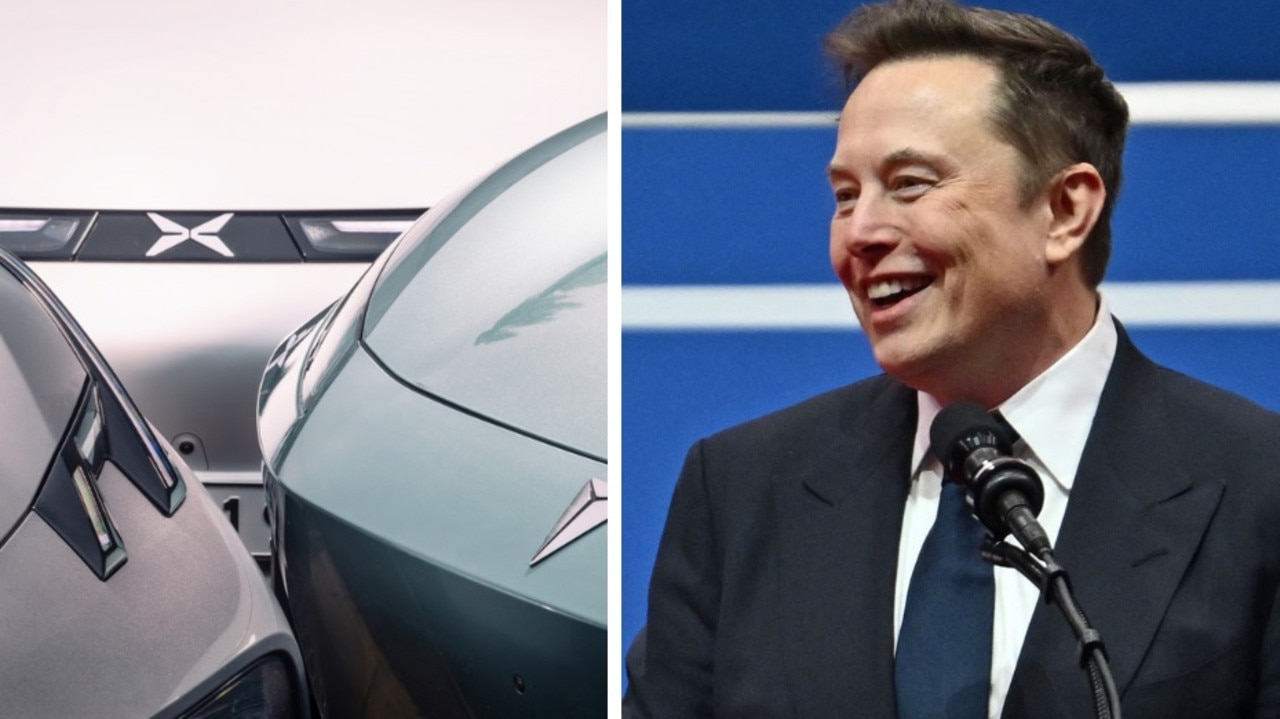Hyundai Santa Fe Hybrid vs Kia Sorento Hybrid
Big families looking for an efficient set of wheels should take a close look at spacious contenders that deliver impressive efficiency.
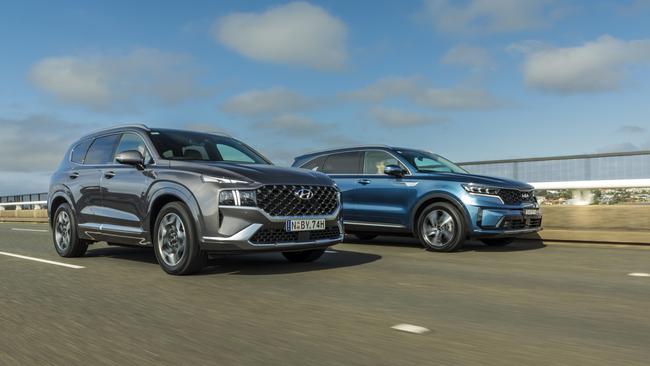
New Cars
Don't miss out on the headlines from New Cars. Followed categories will be added to My News.
Electric cars may be the future but hybrids are what buyers want right now. Australians bought more than 80,000 hybrids last year. The vast majority were Toyotas but that should change this year as rivals look to cash in with new petrol-electric models.
Kia and Hyundai have added hybrid tech to their family focused Sorento and Santa Fe seven-seat SUVs.
They are mechanically similar, sharing engines and transmissions, but have their own unique style and driving experience.
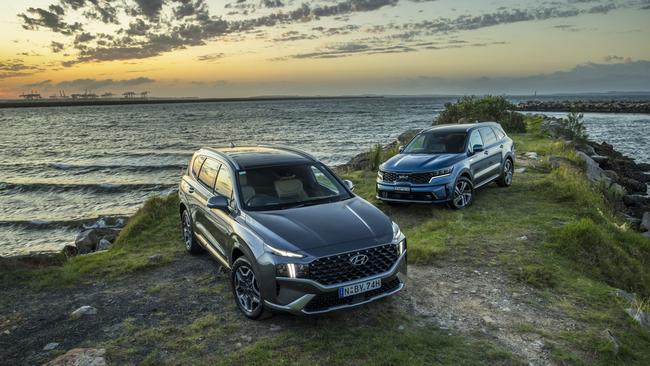
HYUNDAI SANTA FE HYBRID
The Hyundai Santa Fe and Sorento are both powered by a 1.6-litre turbo petrol engine and electric motor making 169kW and 350Nm. A small battery feeds the motor, while a six-speed auto and all-wheel drive put the power to the road.
Hyundai claims fuel use of 6.0L/100km, considerably less than the 10.5L/100km in the petrol V6 Santa Fe but similar to the diesel version.
The hybrid does its best work around town and only requires the cheapest unleaded petrol.
Prices start at $68,300 drive-away for the Elite grade and jump to about $75,200 for the fully loaded Highlander variant we’ve tested here. Both are about $7000 more than their petrol equivalents.
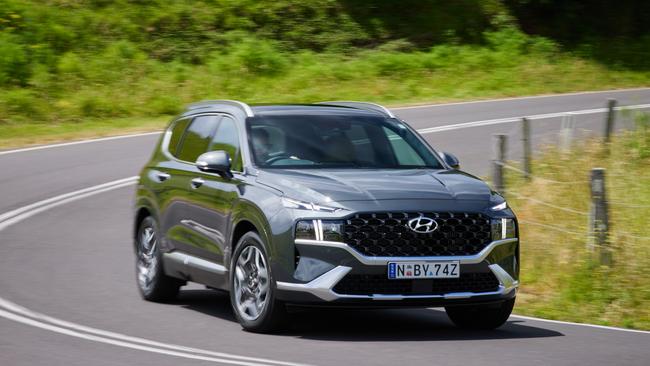
The Santa Fe stands out on the road with head turning looks. A chunky grille is paired with 19-inch alloy wheels, dramatic body creases, a generous helping of chrome highlights and LED lighting front and back.
Inside the Santa Fe has a greater attention to detail than the Sorento, with higher quality materials used throughout.
There is an Alcantara headliner and the pillars are covered with soft fabric compared to hard wearing plastics in the Sorento.
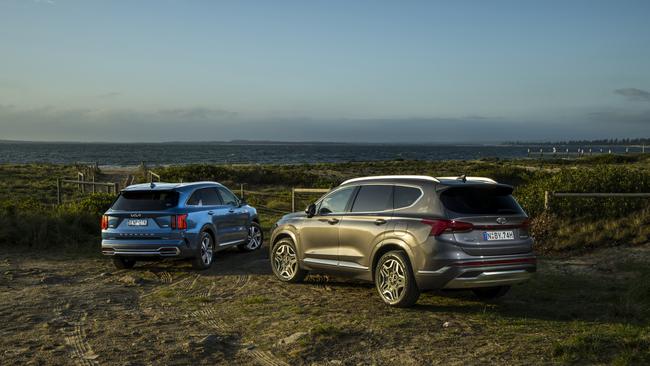
Elsewhere, the differences between the pair come down to style rather than substance. Both cars have a heated steering wheel, as well as electronically adjustable Nappa leather wrapped seats that are heated and cooled up front and heated in the second-row window seats.
Each has a 10.25-inch central touchscreen compatible with Apple CarPlay and Android Auto and a 12.3-inch digital instrument display supplemented by a head-up display that projects vital information onto the driver’s windscreen. The screen graphics, styling and dash layout are different, though.
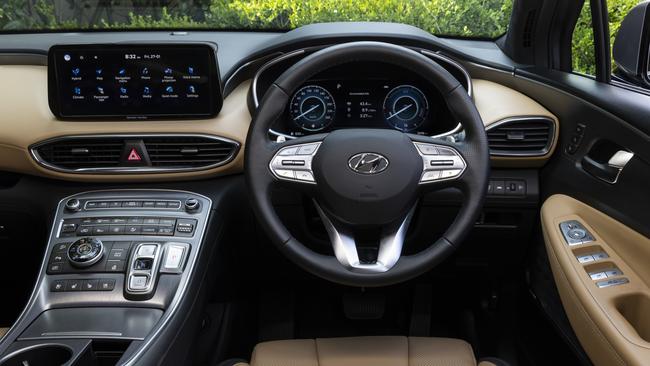
Some will find the Santa Fe’s centre console distracting with its array of buttons and controls compared to the Kia’s streamlined and more usable layout. A 10-speaker Harman Kardon stereo in the Santa Fe trumps the Sorento’s 12-speaker Bose hi-fi. Both have a nifty intercom that allows the driver to deliver messages via the third-row speakers to rear seat passengers.
They each have comprehensive safety with a wide array of active driver aids.
The 1.6-litre turbo and electric motor delivers smooth and silent acceleration off the mark, aided by the smooth-shifting conventional automatic transmission, which keeps the engine on the boil without the noticeable revving of continuously variable transmissions often found in other hybrids.
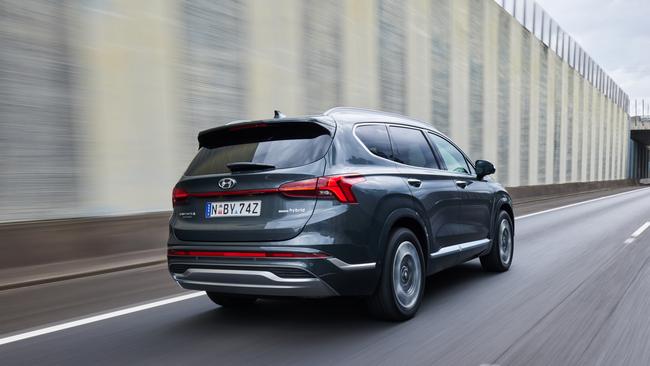
On the road is where the cars differ the most.
The Santa Fe is comfy and best suited to long highway commutes.
In tighter turns it lacks the steering feel of the Kia and softer suspension means it leans more through corners and doesn’t feel as agile.
On the plus side, it soaks up bumps and road imperfections better than the Sorento.
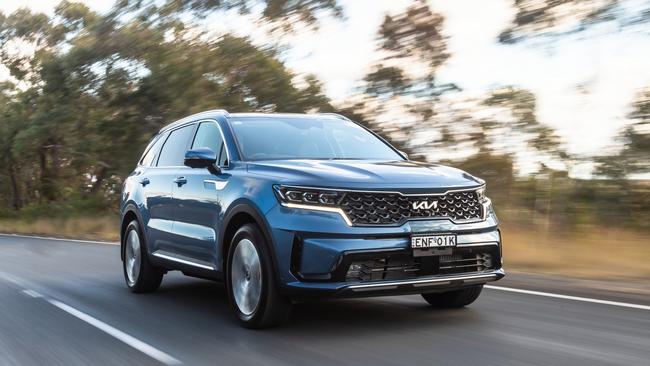
KIA SORENTO
The Kia Sorento Hybrid is available in only fully loaded GT Line guise. Buyers can choose between two-wheel or all-wheel drive, priced from about $72,300 and $75,500 respectively.
As with the Hyundai, they are both roughly $7000 more than petrol or diesel equivalents.
The Sorento’s boxy proportions and dramatic lighting make it the more handsome of the two. A greater distance between the front and rear tyres in the Sorento equates to a more spacious cabin.
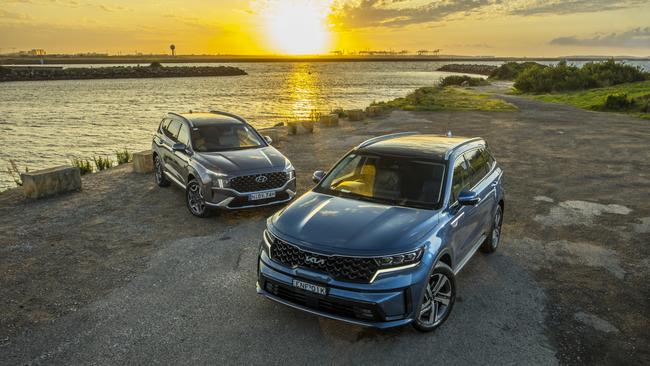
The Sorento has all the latest toys but its cabin feels more hard wearing than the Santa Fe’s and is likely better suited to families with younger kids. It’s easier to access the third row in the Sorento. Both cars have push button access for the third row but in the Sorento two seats fold forward instead of one in the Santa Fe. Both third rows are tight and best suited to young teens and below.
The Sorento has a slightly bigger boot, too.
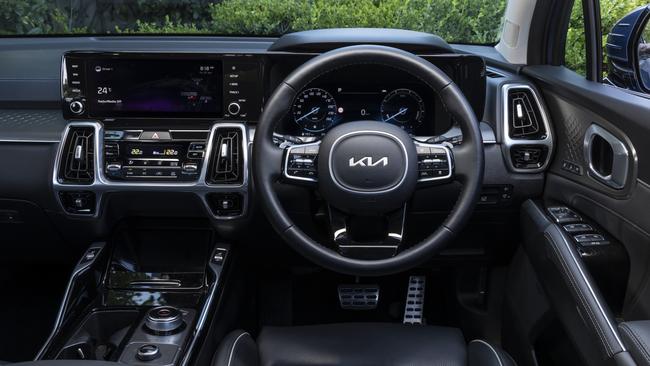
It also trumps the Santa Fe for connectivity. There are three USBs in each of the first and second rows and two in the rear. The Hyundai only has five across three rows. Both machines have a wireless device charger.
The Sorento is sweeter to steer, with sharper steering and firmer suspension making for a more engaging drive. The Kia also has the edge on fuel use claiming 5.8L/100km, which could be due to its slightly lower weight.
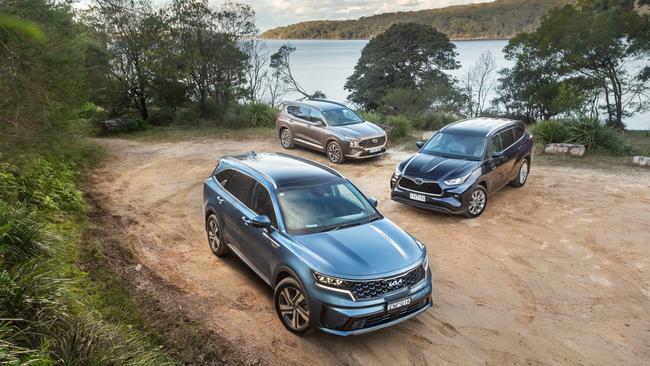
The Kia is about $300 more to service over five years but the deal breaker could be its seven-year/unlimited warranty, which shades the Hyundai’s five-year guarantee.
VERDICT
Both are top-notch SUVs. The Hyundai has a more premium cabin and cheaper servicing but the Kia’s more practical layout, sharper drive and longer warranty gives it a slight edge.
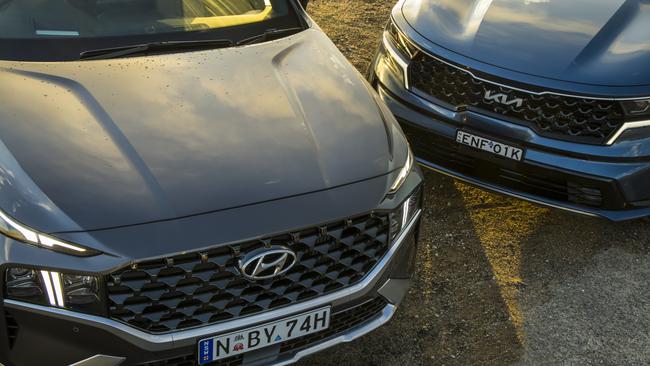
HYUNDAI SANTA FE HYBRID
PRICE From about $75,200 drive-away
ENGINE 1.6-litre four-cylinder turbo petrol and electric motor, 169kW and 350Nm
WARRANTY/SERVICING Five years/unlimited km, $2500 over five years.
SAFETY Seven airbags, auto emergency braking, lane-keep and blind-spot assist, rear cross-traffic alert, safe exit warning, rear seat occupant warning, driver fatigue warning
THIRST 6.0L/100km
SPARE Full-size alloy
LUGGAGE 571 litres
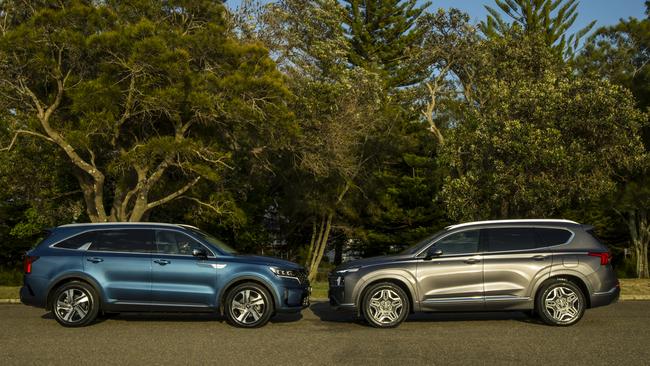
KIA SORENTO GT-LINE HYBRID
PRICE From about $75,200 drive-away
ENGINE 1.6-litre four-cylinder turbo petrol and electric motor, 169kW and 350Nm
WARRANTY/SERVICING Five years/unlimited km, $2500 over five years.
SAFETY Seven airbags, auto emergency braking, lane-keep and blind-spot assist, rear cross-traffic alert, safe exit warning, rear seat occupant warning, driver fatigue warning
THIRST 6.0L/100km
SPARE Full-size alloy
LUGGAGE 571 litres
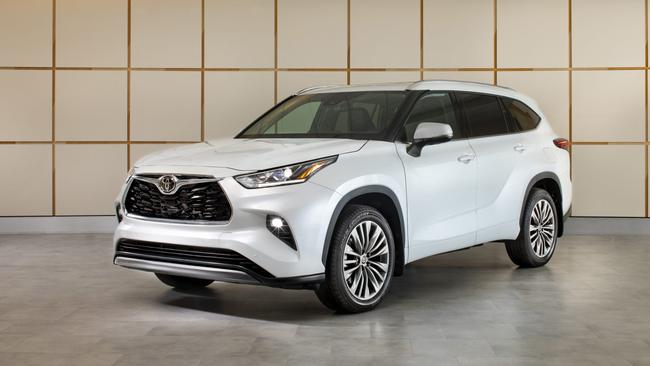
LATE ARRIVAL
The updated Toyota Kluger Hybrid hadn’t arrived in time to be included in this test. The Kluger’s tried and tested hybrid tech is the most efficient, drinking 5.6L/100km. It requires more expensive premium unleaded, though. It is also the most expensive at more than $80,000 drive-away for a range-topping Grande variant. There are cheaper options, though, with petrol-electric power on all model grades including the base GX from about $60,000.


